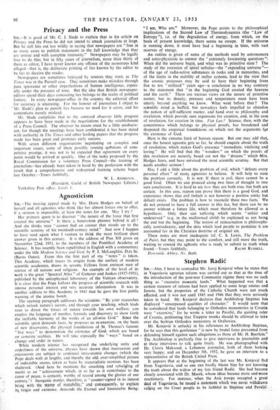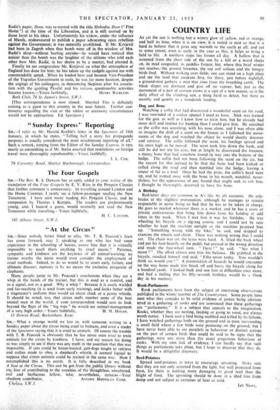Stephen RadiC
SIR,—Alas, I have to contradict Mr. Juraj Krnjevie when he states that in Yugoslavia agrarian reform was carried out so that at the time of
the introduction of the post-war Communist regime there was no such thing as "excessive mosastic lands." What happened was that a certain measure of reform had been applied to some large estates and forests, but the properties of the Catholic Church were not much affected, and it was not until 1945 and 1946 that they,were seriously taken in hand. Mr. Krnjevid declares that Archbishop Stepinac has displayed " unsurpassed qualities of character." It would seem that he considered that lands belonging to Orthodox monasteries in Croatia were "excessive," for he wrote a letter to Pavelie, the quisling ruler of Croatia, petitioning that Trappist monks should be allowed to take over the Serbian Orthodox monastery in Orahovica.
Mr. Krnjevie is unlucky in his references to Archbishop Stepinac, for he says that this gentleman "is now by brutal force prevented from
p defending himself against such allegations as those of Mr. H. Baerlein." The Archbishop is perfectlyfree to give interviews to journalists and at these interviews to talk quite freely. He was photographed with Dr. Clovis Maksoud, a Lebanese journalist, both of them looking very happy; and on December 5th, 1952, he gave an interview to a representative of the British United Press.
It appears that at the beginning of the last war Mr. Kmjevid fled from Yugoslavia, and so one can hardly, blame him for not knowing the truth about the widow of my late friend Radio. She had become closely associated with Dr. Macek, whose ideas became more and snore reactionary. For instance, When the Axis troops occupied a great deal of Yugoslavia, he issued a statement which was never withdrawn calling on the Croat people to be faithful to Stepinac and Pavelie.
Radie's paper, porn, was re-started with the title Slobodne Dom ("Free Home ") at the time of the Liberation, and it is still carried on by those loyal to his ideas. Unfortunately his widow, under the influence of Macek, endeavoured to publish a paper advocating open rebellion against the Government; it was naturally prohibited. If Mr. Krnjevi6 had been in Zagreb when that bomb went off in the window of Mrs. Radid's shop—without hurting anyone—he would have noticed that noisier than the bomb was the laughter of the citizens who told each other how Mts. Radie, in her desire to be a martyr, had planted it.
Finally let me congratulate Mr. Krnjevie on what the atmosphere of England has done for him; he has taken up the cudgels against me with commendable speed. When he landed here and became Vice-President of the Yugoslav Government in exile, he was far more hesitant, despite the urgings of his colleagues, in denouncing Stepinac after his associa- tion with the quisling Pavelie and his various questionable activities be9ame known.—Yours faithfully, HENRY BAERLEIN. Bath Club, 74 St. James's Street, S.W.J.
---[This correspondence is now closed. Marshal Tito is definitely coming as a guest to this country in the near future. Further con- troversy regarding the visit or the visitor or accessory circumstances would not be appropriate. Ed. Spectator.]



































 Previous page
Previous page